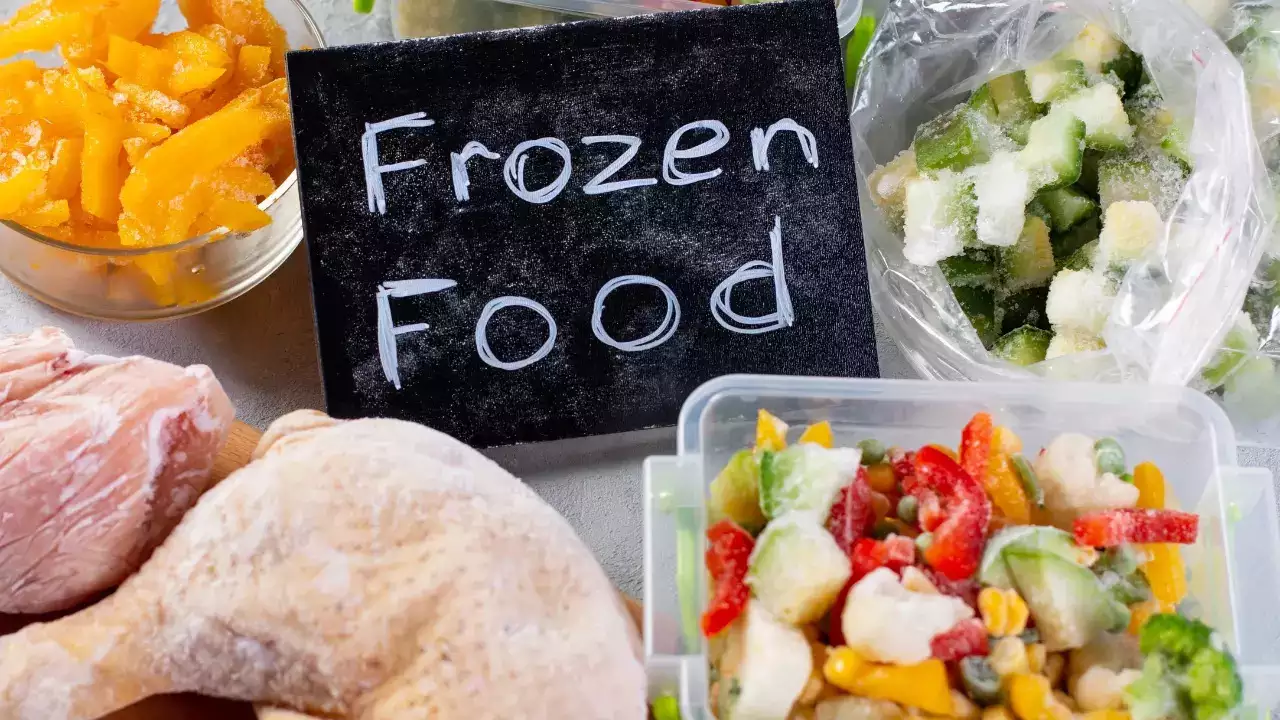In this article, I will examine how regular frozen food consumption affects common health conditions alongside reviewing package ingredients that demonstrate how avoiding frozen meals could be beneficial for your well-being.
Why Frozen Food Can Be a Problem
Frozen food products normally consist of these ingredients:
High sodium
Preservatives
Artificial additives
Tran’s fats
Low fiber
Refined carbs
The substances found in frozen food do not inherently have negative attributes. People with chronic illnesses should avoid consuming these products since their wrong body chemistry can start a sequence of health issues. There exist particular medical circumstances where frozen food usage needs to be minimized intensely or totally avoided.
1. High blood pressure patients should stay away from eating frozen food because it contains high sodium levels
A majority of individuals who suffer from hypertension recognize they should limit their salt consumption. Frozen food contains sneaky salt that secretly affects consumers.
When you eat a standard frozen meal, you get 1,500 mg of sodium that surpasses your advised daily sodium limit by 50 percent. Salt forms a double-duty role because it provides flavor and also functions as a preservative. Food manufacturers prefer this substance because it functions as both a preservative and flavor enhancer in frozen food production.
Individuals who have high blood pressure must consider that additional salt intake leads to:
Increase fluid retention.
Raise systolic and diastolic pressure.
The heart and kidneys face additional pressure due to the consumption of too much salt.
Blood pressure medications become less effective when consumed.
Most low-sodium frozen foods available in stores actually contain more sodium than home-cooked meals do. Microwave frozen dinners should not be used by people who need to maintain control over their blood pressure.
2. People who have Diabetes: Eating frozen foods leads to rapid blood sugar changes
People with diabetes need to regulate food items based on their glycemic load, which indicates how fast specific foods elevate blood sugar. Excessive glucose response occurs in frozen dietary foods made with refined grains such as pasta, pizza, and burritos.
Here’s why that’s dangerous:
Highly elevated glucose levels frequently produce insulin resistance as a result.
Strong fluctuations in blood sugar levels will increase both fatigue and irritability and hunger symptoms.
Strict blood sugar instability tends to damage organs over long periods.
Many frozen food options have extra sugar content in their accompanying sauces, marinades, or dressings. Many savory meals hide sugar as a flavor enhancer. Your blood sugar control will come under threat if you have diabetes or pre-diabetic conditions because these meals disrupt your glucose levels.
3. People with chronic kidney disease should avoid frozen foods because it puts too much strain on their kidneys
An impaired kidney system becomes unable to perform regular waste filtration functions and electrolyte management functions. Frozen food products mainly include elevated amounts of the following substances:
Phosphates (added for texture)
Potassium additives (to maintain color)
Sodium
The kidney function declines rapidly when these additive substances enter the body because they make the following deleterious effects:
Causing electrolyte imbalances
Increasing toxin buildup
Contributing to fluid overload
Some frozen vegetables require additional phosphates along with potassium salts for preservation despite freezing. Patients with kidney diseases must consume fresh produce only or properly selected frozen items with minimum additives — fresh remains the ideal option.
4. People with heart disease
The high content of inflammatory substances in frozen food endangers cardiovascular health because heart disease feeds off such compounds.
The processing of frozen baked goods and pizza crusts depends on Trans fats.
Refined carbs
High sodium
The combination of these ingredients creates a detrimental impact on cholesterol levels through increased LDL cholesterol and lowered HDL cholesterol while raising triglyceride count. Plaque formation in arteries develops from these extreme food components that accumulate along vessels in the body.
People who already experienced a heart attack or stroke or possess a family background of cardiovascular disease face hidden cardiovascular harm from frozen food consumption.
5. If You Have IBS or Digestive Issues: Frozen Foods Can Trigger Flare-Ups
These conditions, together with IBS, Cohn’s disease, and colitis, need specific food management. The consumption of frozen food comes with these main issues:
It’s low in fiber.
Gums and emulsifiers present in frozen food items tend to cause irritation of the intestinal lining.
The food might contain artificial sweeteners that negatively affect the healthy gut bacteria.
People who have IBS often do not understand how the minimal additives in frozen products like carrageenan and maltodextrin trigger increased bloating and stomach cramps along with irregular bowel movements.
6. Individuals with Autoimmune disorders
Autoimmune conditions, including lupus and rheumatoid arthritis, together with multiple sclerosis, react sensitively to inflammatory substances in frozen food. Many frozen food products contain:
Artificial dyes
Preservatives like BHA/BHT
When cooked at high temperatures, the process generates advanced glycation end-products known as AGEs.
The substances activate the immune system to create more intense bodily responses, which cause flare-ups together with joint pain and fatigue. When you have ongoing inflammatory responses in your body, you should consider eliminating frozen foods because it may help manage your symptoms better.
7. People who have weight problems or are obese should stay away from frozen products
The calorie content in frozen prepared foods tends to be high, but they provide minimal satisfaction to the consumer. The habit of eating multiple portions without awareness leads to several health issues.
Caloric surpluses
Blood sugar crashes
Increased cravings
The absence of both dietary fiber and protein in these meals creates a situation where your body fails to receive stop-eating signals.
Frozen food stands as an obstacle that makes weight loss or weight maintenance challenging.
The Bigger Picture: What Frozen Food Really Does to Your Health
It’s not just about ingredients. It’s about patterns. Persons who make frozen food their main food source generally face these health complications:
Cook less.
Eat fewer fresh vegetables.
Consume more processed meat.
You would miss the nutritional value of whole grains together with healthy fats.
The continuous consumption of frozen food gradually transforms all aspects of your eating habits.
One frozen food alone does nothing to change your diet pattern. But the change in your dietary patterns occurs when you consistently eat that particular meal.
What Can You Eat Instead?
You have probably reached this point while contemplating alternate dietary choices.
Here are some easy swaps:
You should prepare basic dinners during weekends and then keep them frozen until needed.
Choose canned beans and lentils along with tuna, but remember to rinse the canned items to decrease sodium content.
Maintain a supply of raw and quick-frozen vegetables that contain no additional sauces or salt.
Set a slow cooker to prepare meals during your late evenings.
Prepare your portions of grain bowls, salads, and soups ahead for future consumption.
Frequently Asked Questions
1. Does the nutritional quality of frozen vegetables match the quality of frozen meals?
Not at all. Regular frozen vegetables without salt and seasoning are of the same nutritional value as fresh produce.
Pre-seasoned frozen foods along with dishes containing sauces are ineffective for consumption.
2. Does eating frozen foods result in water retention?
Yes. Frozen foods that contain elevated sodium levels will cause fluid accumulation that leads to swelling and puffiness, specifically affecting individuals with kidney or heart ailments.
3. What is the maximum frequency of consuming frozen foods?
Plain frozen vegetables, including fruits, can be eaten often, but frozen full meals should limit consumption to once per week at most.
Complete frozen meals should be limited to consumption once a week. Consider eating frozen food no more than once per week.
4. Do plastic containers used to heat frozen products create health risks?
Yes. Steaming frozen food inside plastic containers allows BPA chemical residues to escape into your food.
You should move frozen prepared dishes into glass or ceramic serving containers before placing them in the microwave.
Wrapping up
We often reach for frozen food out of habit, convenience, or exhaustion. But the truth is — your body knows the difference.
Every meal matters when you’re managing a chronic medical condition. And while it’s not about fear or perfection, it is about making smarter choices.



Very good https://lc.cx/xjXBQT